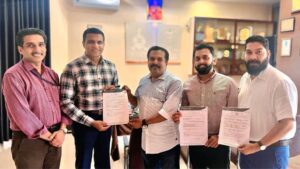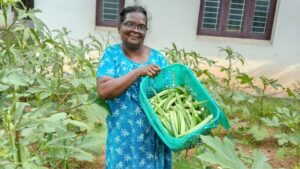When 29-year-old homemaker Grace Antony of Kottayam in Kerala set out to provide pesticide-free vegetables for her children, she never imagined it would lead to a thriving business. What started as a small experiment in her backyard has now grown into a 2,500 sqft hydroponics farm, supplying fresh, organic leafy greens to health-conscious consumers and earning her a steady income.
Grace, who did her post-graduation in commerce, never had any experience in farming. But her deep concern about the rising use of pesticides in vegetables available in the market forced her to start growing vegetables on a small scale at her home.
As her experiment yielded positive results, she started researching alternative farming methods and came across hydroponics—a soil-less farming technique that uses nutrient-rich water to grow plants. Soon, she decided to set up a hydroponic farm on her 12-cents of land to grow spinach, lettuce, cucumber, micro-greens and other herbs like basil leaves.
“The difference in taste and quality is remarkable. I started growing vegetables at my home to provide my children safe and nutritious food. That’s when I thought—why not extend this to others who are also looking for chemical-free vegetables?” she told “Open Digest.”
With support from her husband Kevin and her brother Ebin, she invested in a larger setup, transforming the 12-cent plot near her home into a full-fledged 2,500 sqft hydroponics farm. Using controlled environment techniques, she now cultivates a variety of leafy greens.

“We invested nearly 35 lakhs for setting up the fully automated farm. The farm became operational in the first week of February, and we completed three harvests by March. We have a customer base who regularly buy vegetables from us. There is a huge demand for pesticide-free vegetables in the market,” she said.
Her farm operates with minimal water usage—nearly 90% less than traditional farming—and produces high yields without soil-borne diseases. The clean, residue-free vegetables have found a dedicated customer base, including doctors, health-conscious families, and even restaurants.
“Hydroponics requires close monitoring but is not as labour-intensive as traditional farming. Once the system is in place, it’s all about maintaining the right nutrient balance and environmental conditions,” she explains.
Grace Antony plans to expand her farm and introduce more varieties of micro greens. “My goal is to make chemical-free vegetables accessible to more people while promoting sustainable farming,” she says.





